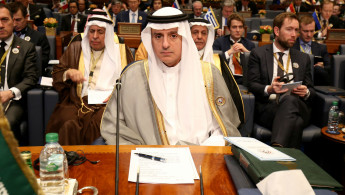Saudi Arabia threatens 'fall' of Qatar government, unless it pays for US troops in Syria
Saudi Foreign Minister Adel al-Jubeir has said that Qatar should foot the bill for US presence in Syria.
2 min read
Adel al-Jubeir made new threats against Qatar [AFP]
Saudi Foreign Minister Adel al-Jubeir warned its rival the Qatar government that it faced its imminent demise unless it funded a US military presence in Syria.
Jubeir said Qatari troops should replace US soldiers in northern Syria or Washington could pull its support for Doha leading to its downfall.
"Qatar has to pay for US military presence in Syria and send its military forces there, before the US President [Donald Trump] cancels US protection of Qatar," he said in a statement.
He warned that without US protection, Qatar's government "would fall there in less than a week".
Jubeir indicated that the "protection" he was alluding to was "the presence of a US military base on its territory".
Qatar hosts al-Udeid, one of the largest US' airbases in the world. It has been at the forefront of the US fight against the Islamic State group in Syria and Iraq.
Riyadh has led a blockade on Qatar since June, when Saudi Arabia, the UAE, Bahrain and Egypt cut ties with Doha, accusing it of supporting terrorism and being too close to Iran. Qatar strongly denies the claim.
Since then, Saudi and UAE ministers and media have routinely attacked Qatar and attempted to woo Trump to their side.
President Trump promised earlier this month that the some 2,000 US troops in Syria helping in the fight against IS could be withdrawn, now that the threat of the militant group had been diminished.
After harsh criticism of the plan from military commanders and Pentagon officials, he then suggested Arab countries could play a role in securing the peace in northern Syria.
"We have asked our partners to take greater responsibility for securing their home region, including contributing large amounts of money for the resources, equipment, and all of the anti-ISIS effort," Trump said.
"Increased engagement from our friends, including Saudi Arabia, the United Arab Emirates, Qatar, Egypt, and others can ensure that Iran does not profit from the eradication of ISIS."
Egypt's former intelligence chief said Cairo would not join the proposed multi-national Arab force meant to replace US troops in Syria.
Trump initially showed support for Riyadh during the blockade of Qatar, but faced resistance from most policy makers and advisers.
Since then he has tried publically to bridge the divide and urged Saudi Arabia and the UAE to end the "senseless" blockade.
This month, Trump also met Qatar Emir Tamim al-Thani, heaping praise on the leader.
Jubeir said Qatari troops should replace US soldiers in northern Syria or Washington could pull its support for Doha leading to its downfall.
"Qatar has to pay for US military presence in Syria and send its military forces there, before the US President [Donald Trump] cancels US protection of Qatar," he said in a statement.
He warned that without US protection, Qatar's government "would fall there in less than a week".
Jubeir indicated that the "protection" he was alluding to was "the presence of a US military base on its territory".
Qatar hosts al-Udeid, one of the largest US' airbases in the world. It has been at the forefront of the US fight against the Islamic State group in Syria and Iraq.
Riyadh has led a blockade on Qatar since June, when Saudi Arabia, the UAE, Bahrain and Egypt cut ties with Doha, accusing it of supporting terrorism and being too close to Iran. Qatar strongly denies the claim.
Since then, Saudi and UAE ministers and media have routinely attacked Qatar and attempted to woo Trump to their side.
President Trump promised earlier this month that the some 2,000 US troops in Syria helping in the fight against IS could be withdrawn, now that the threat of the militant group had been diminished.
After harsh criticism of the plan from military commanders and Pentagon officials, he then suggested Arab countries could play a role in securing the peace in northern Syria.
"We have asked our partners to take greater responsibility for securing their home region, including contributing large amounts of money for the resources, equipment, and all of the anti-ISIS effort," Trump said.
"Increased engagement from our friends, including Saudi Arabia, the United Arab Emirates, Qatar, Egypt, and others can ensure that Iran does not profit from the eradication of ISIS."
Egypt's former intelligence chief said Cairo would not join the proposed multi-national Arab force meant to replace US troops in Syria.
Trump initially showed support for Riyadh during the blockade of Qatar, but faced resistance from most policy makers and advisers.
Since then he has tried publically to bridge the divide and urged Saudi Arabia and the UAE to end the "senseless" blockade.
This month, Trump also met Qatar Emir Tamim al-Thani, heaping praise on the leader.





 Follow the Middle East's top stories in English at The New Arab on Google News
Follow the Middle East's top stories in English at The New Arab on Google News
![The UAE is widely suspected of arming the RSF militia [Getty]](/sites/default/files/styles/image_330x185/public/2024-11/GettyImages-472529908.jpg?h=69f2b9d0&itok=Yauw3YTG)
![Netanyahu furiously denounced the ICC [Getty]](/sites/default/files/styles/image_330x185/public/2024-11/GettyImages-2169352575.jpg?h=199d8c1f&itok=-vRiruf5)
![Both Hamas and the Palestinian Authority welcomed the ICC arrest warrants [Getty]](/sites/default/files/styles/image_330x185/public/2024-11/GettyImages-2178351173.jpg?h=199d8c1f&itok=TV858iVg)